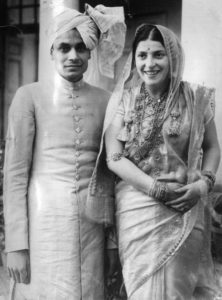
George Tames / The New York Times
April 28, 2017
NEW DELHI — Shobha Magdolna Friedmann Nehru, a Hungarian Jew who narrowly escaped the Holocaust, married into India’s leading political family and witnessed religious and ethnic violence convulsing both her native and adopted countries, died on Tuesday at her home in the Himalayan foothills. She was 108.
Her death was confirmed by her son Ashok.
Mrs. Nehru was known by her Hungarian nickname, Fori, but did not often speak about her background. After marrying the Indian diplomat Braj Kumar Nehru in 1935, she took the name Shobha (which was selected by her in-laws), dressed in saris and was so thoroughly assimilated that acquaintances often took her for a pale-skinned Kashmiri Pandit, like the Nehrus themselves.
As a member of the Nehru household, she grieved beside the bodies of Mahatma Gandhi, Indira Gandhi and Rajiv Gandhi, all of whom were assassinated. And at a key moment in the country’s history, she delivered a hard truth to an imperious leader who rarely heard it.
Mrs. Nehru typically stayed away from political matters, but she took the unusual step of confronting Prime Minister Indira Gandhi, her close friend and cousin by marriage, when she believed that the state of emergency Mrs. Gandhi declared in 1975 had too severely rolled back human rights in India.
Mrs. Nehru’s husband, in his own memoir, reflected that virtually nobody — including himself — was willing to take the risk of alienating Mrs. Gandhi, who resented any criticism of her son. He said his wife was less cautious, and “certainly on more intimate terms with Indira Gandhi than I was.”
“I guess she was like that,” Ashok Nehru said. “She felt she had to get the truth across to her. It was a close family relationship, not a political relationship. She felt free enough to do that.”
Mrs. Nehru was 90 when she asked an Oxford classmate of her son’s, the British historian Martin Gilbert, to suggest some reading material on the history of the Jews. Mr. Gilbert wrote that he was perplexed by the inquiry, having always seen her as “an Indian woman,” until she recounted the story of her childhood in Budapest.
“Auntie Fori wanted to learn the history of the people to whom she belonged, but from whom, 67 years earlier, she had moved away, to the heat and dust and challenges of India,” Mr. Gilbert wrote in “Letters to Auntie Fori: The 5,000-Year History of the Jewish People and Their Faith,” published in 2002.
An anti-Semitic tide was rising in Hungary, and the family was forced by law to revert to the name Friedmann. In 1919, hoping to stave off a Communist revolution, right-wing mobs roamed the streets, killing Jews.
“Once a week my father would travel to the villages to get food,” she told Mr. Gilbert. “He had a house on Lake Balaton. One summer we went there — by train — and I saw people hanging from trees. It was terrible for us children to look at.”
By the time she was 20, strict quotas had been introduced for Jewish students in Hungarian universities, and her parents sent her to the London School of Economics. There she met B. K. Nehru, a member of a distinguished Kashmiri family, whose cousin Jawaharlal was already a leader of the Indian independence movement (and would later become India’s first prime minister).
Her parents were skeptical of the match, Mr. Nehru recalled in his memoir: “How could their beautiful and lovely daughter marry a black man in a distant country of which they know nothing, and who, by his own confession, belonged to a family of jailbirds?”
His parents were skeptical as well. But when the two sets of parents met in Budapest, there was a sudden thaw, Mrs. Nehru told Mr. Gilbert.
The Hungarian bride stepped off the ship in a sari and never looked back.
As part of a countrywide tour, she was taken by her future mother-in-law to the prison where Jawaharlal Nehru was being held by the British. Seeing that she was in tears, he later sent her a gently chastening letter, informing her: “Nehrus don’t cry in public. They keep a stiff upper lip.”
Meanwhile, her relatives and friends in Hungary were scattering. Her father was saved by his German housekeeper; her brother, an officer in the Hungarian Army, swam across the Danube to Czechoslovakia; her best friend drove across the border with her son hidden in the trunk of her car.
She was busy with her own crises in India. As partition approached, Delhi was flooded with refugees: Hindus who had been pushed out of Pakistan, Muslims who were boarding trains for Pakistan, mobs pumped with murderous rage on both sides. She learned, after she had helped families crowd onto one such train, that everyone aboard had been dragged off and killed while crossing Punjab.
“Can you imagine the horror?” she told Mr. Gilbert. “For several days we sent no train.”
For the newly arrived refugees, she began an employment campaign, opening a shop to sell the handicrafts of refugee women that grew into a vast network, the Central Cottage Industries Emporium.
She would not return to Hungary until 1949, along with three sons who had never seen her in anything but a sari.
B. K. Nehru died in 2001. In addition to her son Ashok, Mrs. Nehru is survived by two other sons, Aditya and Anil; four grandchildren; and three great-grandchildren.
As the wife of a high-level dignitary, Mrs. Nehru moved from Washington, to the northeastern state of Assam, to London, but thoughts of Hungary’s Jews never entirely left her. She told Mr. Gilbert that at official receptions, she could not bring herself to shake hands with the German ambassador.
“I have a feeling of guilt,” she said. “I wasn’t there. I was safe. The guilt feeling is still with me. Why should I not have suffered?”

